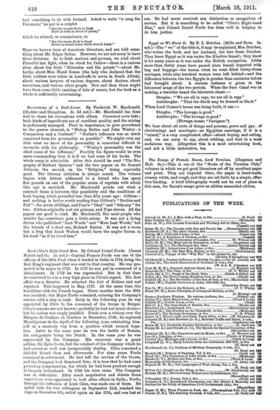An Englishman in Ireland. By R. A. Scott-James. (J. W.
Dent and Sons. 5s. net.)—Mr. Scott-James saw Ireland from a canoe and from other, sometimes more advantageous, standing or sitting points. He describes the boat, which he found unequal to the stormy surface of Irish lakes—" which things are a parable "—and his equipment ; and ho tells ns how he saw the cities (or villages) of many men, and learnt their thoughts. Belfast was his starting point ; his first stage was to go by the Logan Canal to Lisburn. Oa reaching Belturbet he transferred his raft by rail to the Shannon, which he ascended as far as Limerick. The Shannon, as our author tells us, is the finest river in the United Kingdom, though scarcely the most attractive, and it is well that we should know something more about it. All this is good to hear, and if the book told us nothing else it would be good to read ; but there is something more, something which helps us to understand Irish character. We fancy that his sympathies are somewhat inclined to the Nationalists. He seems, for instance, to admire an Irishman who thought cattle-driving a good way of draw- ing attention to the conditions of land tenure. As to land tenure, we would only say that the grazing farms are the most profitable of Irish industries ; as to the cattle themselves, the case is perfectly plain. The proceeding is brutally cruel. Oxen and cows never cease to feed except when they sleep or chew the cud. To " drive " them is to torture them Castle and Court House: Reminiscences of Thirty Years in Ireland, by Ramsay Colles (T. Werner Laurie, 12s. 6d. net), tells us something about Ireland and the Irish, and something about literature in general. Mr. Colles, for instance, gives three chapters to Algernon Charles Swinburne (so at least the three are headed, bat the first is given to Southey and Wordsworth. "What has all this to do with Swinburne ? " the writer himself asks). Swinburne, however,
had something to do with Ireland. Asked to write "a song for Unionists," he put in a couplet
" See the ravens flock to feast Dark as robe or creed of priest,"
which he altered, on remonstance, to
" See the raven flock to feast
Dense as round some death-struck beast."
Then we have a turn at American literature, and are told some- thing about Mr. Edgar Saltus. However, we are not sorry to have these divisions. As to Irish matters and persons, we read about Parnell's last fight, when he stood for Carlow—there is a curious story about the Irish "illiterates and the priests "—about Mr. Lecky, about Miss Maud Gonne (the lady who declared that the Irish soldiers were taken in handcuffs to serve in South Africa), about various lawyers of various degrees, about doctors, about musicians, and various other people. Now and then there might have been some little excising of lists of names, but the book as a whole is sufficiently entertaining.











































 Previous page
Previous page